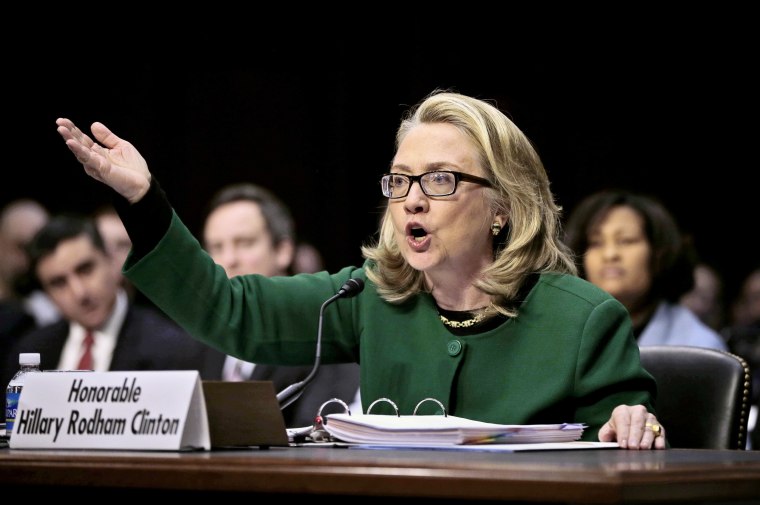Hillary Clinton is testifying before a House committee charged with investigating the Benghazi attacks once again. More than three years after the attacks and eight Congressional investigations later, a reminder of the story's main points are in order.
April 5, 2011: Chris Stevens arrived in Benghazi to establish U.S. presence there as the government of Moammar Qaddafi was falling.
Spring and Summer 2012: The security state in Benghazi deteriorated, especially toward Western targets.
May 26, 2012: Stevens became ambassador to Libya.
July 7, 2012: National elections took place in Libya with high participation rates and relative peace.
September 11, 2012: The attacks on the U.S. compound in Benghazi, Libya that killed four Americans: Ambassador Chris Stevens, State Department employee Sean Smith and CIA security contractors Tyrone Woods and Glen Doherty.
September 16, 2012: Ambassador Susan Rice appeared on five Sunday political shows that the attacks were “spontaneous” and the result of an anti-Muslim video made by an American. Rice’s statements lead to weeks of vague comments by the administration, which would not definitively say if the attacks were spontaneous or planned or an act of terrorism or not. The vagueness fueled critics who alleged the administration was orchestrating a cover up.
November 6, 2012: President Barack Obama was reelected to a second term.
December 19, 2012: The State Department’s independent investigation into the Benghazi attacks released its report and did not implicate Secretary of State Hillary Clinton for any wrongdoing but did recommend that senior officials that the board found to have “unsatisfactory leadership” should be disciplined.
December 2012: The first of eight congressional committees investigating the Benghazi attacks released its report. This was a bipartisan report by the Senate Committee on Homeland Security and Governmental Affairs that found that the State Department did not respond to a dire security needs and that administration officials were “inconsistent” in publicly saying the attack was the result of a terrorist.
January 23, 2013: Clinton gives her first testimony about Benghazi before Congress. She appears before the Senate Foreign Relations Committee and the House Foreign Affairs Committee.
In the most memorable moment from her testimony, Clinton said “What difference, at this point, does it make” on why the “militants” killed four Americans.
February 1, 2013: Clinton officially steps down as secretary of state.
November 2014: The House Intelligence Committee wrapped up its investigation that lasted two years. The report did not find any wrongdoing on behalf of President Obama or Secretary Clinton and that confusing, and found that statements made about the attacks were not intentional.
May 2014: Not satisfied that the previous seven committees found no major wrongdoing other than the failure to respond to a deteriorating security situation in Benghazi, the House of Representatives voted mostly along party lines to form a special committee to investigate Benghazi and Clinton.
September 17, 2014: The Select Committee On Benghazi holds its first hearing
December 10. 2014: The committee holds its second hearing.
January 27, 2015: The committee holds its third hearing.
March 2, 2015: The committee found that Clinton used her own personal email account and not an email issued by the State Department.
April 12, 2015: Clinton announces her candidacy for the Democratic presidential nomination.
May 2015: Benghazi committee releases its interim report, which states they have found that more people have to be interviewed.
June – October 2015: The committee interviews four of Clinton’s closest advisers behind closed doors.
August 12, 2015: The FBI requests Clinton's private email server.
September 30, 2015: House Majority Leader Kevin McCarthy suggested on Fox News that the Benghazi committee was formed to hurt Clinton’s poll numbers.
October 11, 2015: Former Republican staffer on the Benghazi committee alleged that the committee’s investigation became a “partisan investigation.”
October 22, 2015: Clinton testifies before the committee.
TBD 2016: Benghazi committee is expected to released its final report.
November 8, 2016: Presidential election

